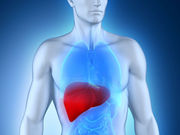MS-based profiling combined with clinical variables accurately identifies nonalcoholic steatohepatitis
WEDNESDAY, Oct. 5, 2016 (HealthDay News) — Mass spectrometry (MS)-based profiling combined with clinical variables can identify nonalcoholic steatohepatitis (NASH), according to a study published in the October issue of Clinical Gastroenterology and Hepatology.
You Zhou, Ph.D., from the Minerva Foundation Institute for Medical Research in Helsinki, and colleagues used MS-based analytic platforms to measure levels of lipids and metabolites in blood samples from 318 adults who underwent liver biopsy for suspected NASH. In order to build and validate the model, participants were divided into estimation and validation groups (223 and 95 participants, respectively).
The researchers found that, compared to those without NASH, subjects with NASH more frequently had features of the metabolic syndrome and the variant in PNPLA3 encoding I148M. A model was developed to identify subjects with NASH based on clinical data and PNPLA3 genotype (NASH Clin Score), which identified subjects with NASH with an area under the receiver operating characteristic of 0.778. The NASH ClinLipMet Score was developed using variables from the NASH Clin Score and MS-based factors associated with NASH; the score identified patients with NASH with an area under the receiver operating characteristic of 0.866. The accuracy of identifying patients with NASH was significantly higher for the NASH ClinLipMet Score than with the NASH Clin Score or MS-based profiling alone.
“These data show that MS-based profiling combined with clinical variables may help in the development of a noninvasive diagnosis of NASH,” the authors write.
Full Text (subscription or payment may be required)
Copyright © 2016 HealthDay. All rights reserved.








